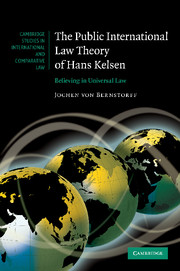Book contents
- Frontmatter
- Contents
- Preface
- Introduction
- PART I The quest for objectivity: the method and construction of universal law
- 1 Method and construction of international law in nineteenth-century German scholarship
- 2 Kelsenian formalism as critical methodology in international law
- 3 An “objective” architecture of international law: Kelsen, Kunz, and Verdross
- PART II The outlines of the cosmopolitan project – the actors, sources, and courts of universal law
- Postscript – on Kelsenian formalism in international law (2010)
- Career sketches: Hans Kelsen, Alfred Verdross, and Josef Laurenz Kunz
- Bibliography
- Index
- CAMBRIDGE STUDIES IN INTERNATIONAL AND COMPARATIVE LAW
- References
1 - Method and construction of international law in nineteenth-century German scholarship
Published online by Cambridge University Press: 03 May 2011
- Frontmatter
- Contents
- Preface
- Introduction
- PART I The quest for objectivity: the method and construction of universal law
- 1 Method and construction of international law in nineteenth-century German scholarship
- 2 Kelsenian formalism as critical methodology in international law
- 3 An “objective” architecture of international law: Kelsen, Kunz, and Verdross
- PART II The outlines of the cosmopolitan project – the actors, sources, and courts of universal law
- Postscript – on Kelsenian formalism in international law (2010)
- Career sketches: Hans Kelsen, Alfred Verdross, and Josef Laurenz Kunz
- Bibliography
- Index
- CAMBRIDGE STUDIES IN INTERNATIONAL AND COMPARATIVE LAW
- References
Summary
Those German-speaking writers who thought of themselves as positivists used different methodological conceptions in their search for an “objective” principle of international law. This principle was to contribute to a theoretical harmonization of the presumed binding nature of international law on the one hand, with the assumption that the sovereign will of the state formed the basis of the validity of international law on the other. Such a construct posed considerable problems for those who wrote about international law, because in contrast to state law, there was no central authority that stood above the states and was charged with enacting norms and enforcing the law. Those who created the law and those to whom it was addressed were one and the same. Moreover, starting from various definitions of law, nineteenth-century authors sought to provide what they considered a methodologically superior answer to the challenge of John Austin's question of whether law was possible at all between sovereign entities, and if so, how. This question assumed central importance in the second half of the nineteenth century also because a simple identification of international legal norms with rules of morality and reason seemed increasingly untenable under the rule of positivism in general jurisprudence.
Kaltenborn and the “objective principle” of international law
In 1847, C. Kaltenborn, in his Kritik des Völkerrechts [A Critique of the Law of Nations], had undertaken a comprehensive analysis of the textbooks on international law that had appeared in Germany in the first half of the century.
- Type
- Chapter
- Information
- The Public International Law Theory of Hans KelsenBelieving in Universal Law, pp. 15 - 43Publisher: Cambridge University PressPrint publication year: 2010
References
- 2
- Cited by



